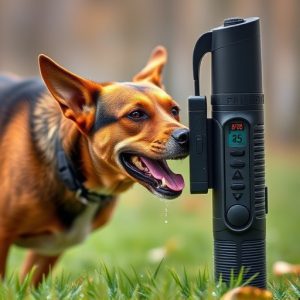Mail Carrier Safety: Dog Pepper Spray Legalities and Best Practices
Mail carriers in the US can use dog pepper spray for self-defense while navigating potentially hazar…….
Mail carriers in the US can use dog pepper spray for self-defense while navigating potentially hazardous deliveries, but restrictions vary by state (known as Dog Pepper Spray Restricted States). While Texas and Florida allow open carry without a permit, states like California and New York heavily regulate or prohibit its use. Carriers in restricted states must understand local laws, obtain necessary permits, and undergo proper training to deploy the spray safely while adhering to legal guidelines.
“In today’s diverse and sometimes unpredictable urban environments, mail carriers require effective tools to ensure their safety while on the job. One such tool gaining traction is dog pepper spray, known for its quick incapacitating effect. This article delves into the world of mace spray, exploring its utility for mail carriers and navigating the legal considerations surrounding its use in various Dog Pepper Spray Restricted States. We’ll discuss safe handling practices, alternative safety measures, and why understanding these tools is crucial for peace of mind.”
- Understanding Mace Spray: A Tool for Mail Carriers
- Legal Considerations: Dog Pepper Spray in Different States
- Safe Use and Handling Practices for Mail Carriers
- Alternatives and Safety Measures to Protect Mail Carriers
Understanding Mace Spray: A Tool for Mail Carriers
Mace spray, also known as dog pepper spray, is a non-lethal self-defense tool that uses capsaicin, the same compound found in chili peppers, to temporarily incapacitate an attacker. For mail carriers, navigating potentially hazardous deliveries can be part of their daily routine. In many states, carrying mace spray is legal and even encouraged for personal safety. However, there are restrictions; some states have specific rules regarding who can possess and use dog pepper spray, including limitations on its availability to non-law enforcement personnel.
Understanding the legal landscape around mace spray is crucial for mail carriers looking to protect themselves. States like California and New York have stringent regulations, classifying mace spray as a controlled substance with restricted access. In contrast, other states like Texas and Florida allow citizens to carry mace spray for self-defense without a permit. Knowing these restrictions, especially when traveling across state lines, is essential for mail carriers who wish to utilize this tool effectively while adhering to local laws.
Legal Considerations: Dog Pepper Spray in Different States
The use of dog pepper spray, or mace spray, by mail carriers and other delivery personnel is a controversial topic with significant legal implications. While some states allow the use of non-lethal force for self-defense, many have stringent regulations restricting the carrying and use of pepper spray. Understanding these laws is crucial for mail carriers to ensure they remain within the boundaries of the law while protecting themselves in potentially dangerous situations.
In the United States, the legal status of dog pepper spray varies widely from state to state. Some states, like Texas and Florida, have relatively few restrictions on the possession and use of pepper spray, including for private citizens and delivery personnel. In contrast, other states, such as California and New York, have more stringent regulations that limit or outright prohibit the carrying of pepper spray by individuals who are not law enforcement officers. Mail carriers operating in these restricted states must adhere to local laws, which often require permits or specific training before they can legally deploy pepper spray during deliveries.
Safe Use and Handling Practices for Mail Carriers
Mail carriers are now permitted to carry pepper spray, specifically dog pepper spray, as a tool for self-defense while on the job. However, there are strict guidelines and safe handling practices that must be followed. It’s crucial to understand that this powerful weapon should only be used in extreme situations where personal safety is at risk. Mail carriers should undergo proper training to learn how to effectively deploy the spray, ensuring minimal harm to bystanders and pets, especially in Dog Pepper Spray Restricted States.
The spray’s active ingredient, capsaicin, can cause severe irritation and even blindness if misused. Therefore, mail carriers must familiarize themselves with their local laws regarding pepper spray use and be aware of any restrictions or requirements for carrying such devices. Proper storage and maintenance are also vital to prevent accidental discharge. Regular practice sessions can help carriers gain confidence in their ability to use the spray effectively while adhering to safety protocols.
Alternatives and Safety Measures to Protect Mail Carriers
Mail carriers, like all delivery personnel, need effective yet safe tools to protect themselves while on the job. While mace spray has been a go-to option for years, there are growing concerns about its use due to health and safety risks. One alternative gaining popularity is dog pepper spray, known for its strong irritant properties that deter potential attackers without causing severe harm. However, it’s crucial to note that dog pepper spray usage is restricted in many states, with varying regulations regarding its possession and application.
To ensure the safety of mail carriers, several other measures can be taken, including carrying a personal alarm or using reflective clothing for better visibility during night shifts. Additionally, maintaining clear communication with dispatchers and colleagues, as well as staying alert and aware of surroundings, are vital components of a comprehensive safety strategy. Moreover, knowing local laws regarding self-defense tools is essential, given the varying restrictions on items like pepper spray, especially in Dog Pepper Spray Restricted States.
In conclusion, while dog pepper spray can be a valuable tool for mail carriers facing aggressive dogs, it’s crucial to understand its legal status varies across Restricted States. Safe handling and alternative measures, such as improved fencing and community education, are essential to protect mail carriers without relying solely on chemical agents. By adhering to best practices and staying informed about local regulations, carriers can ensure a safer work environment.


